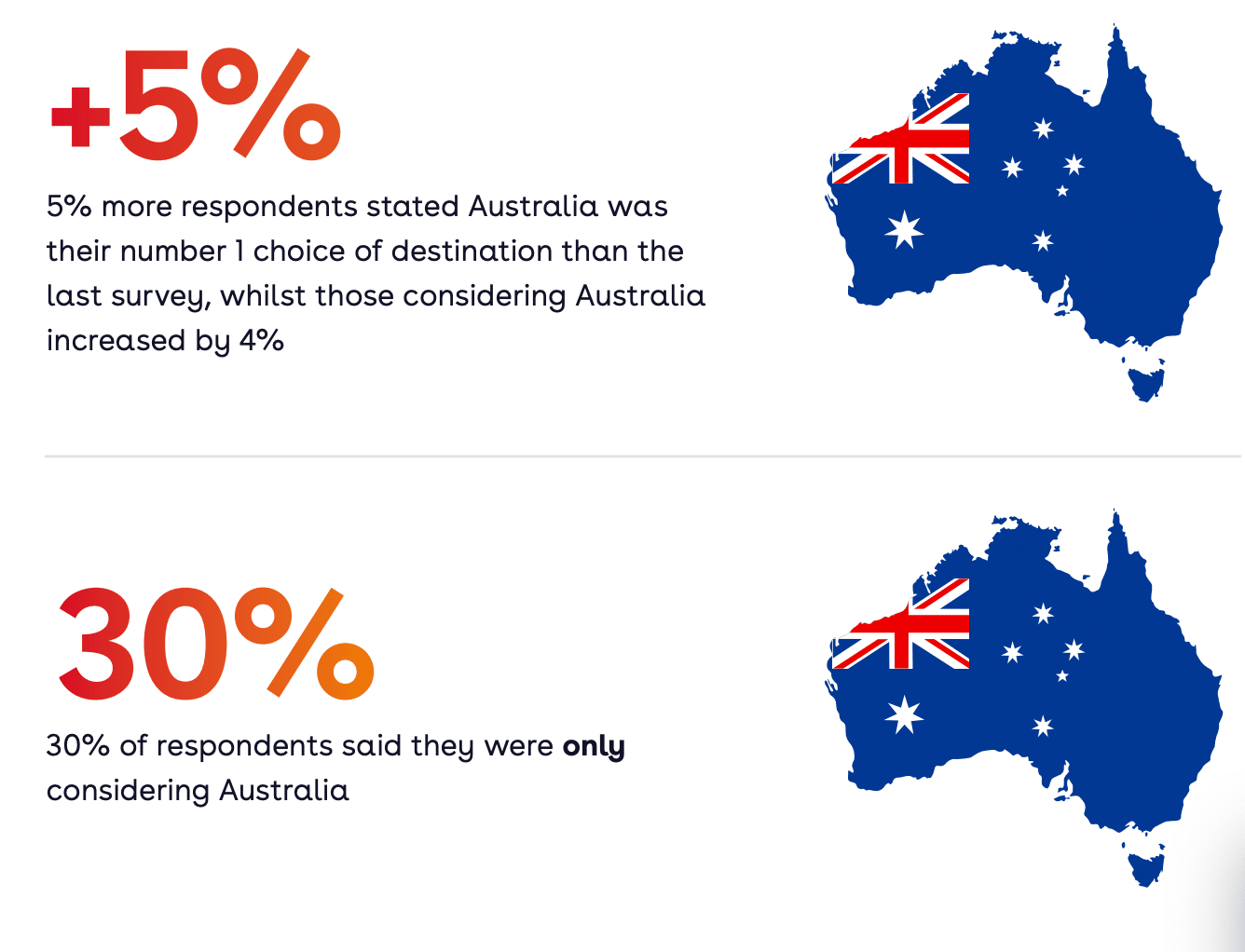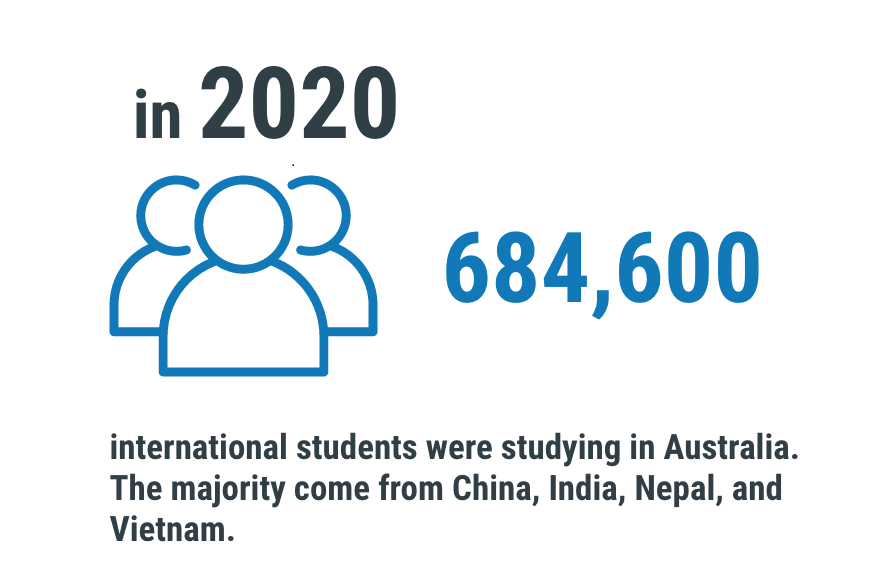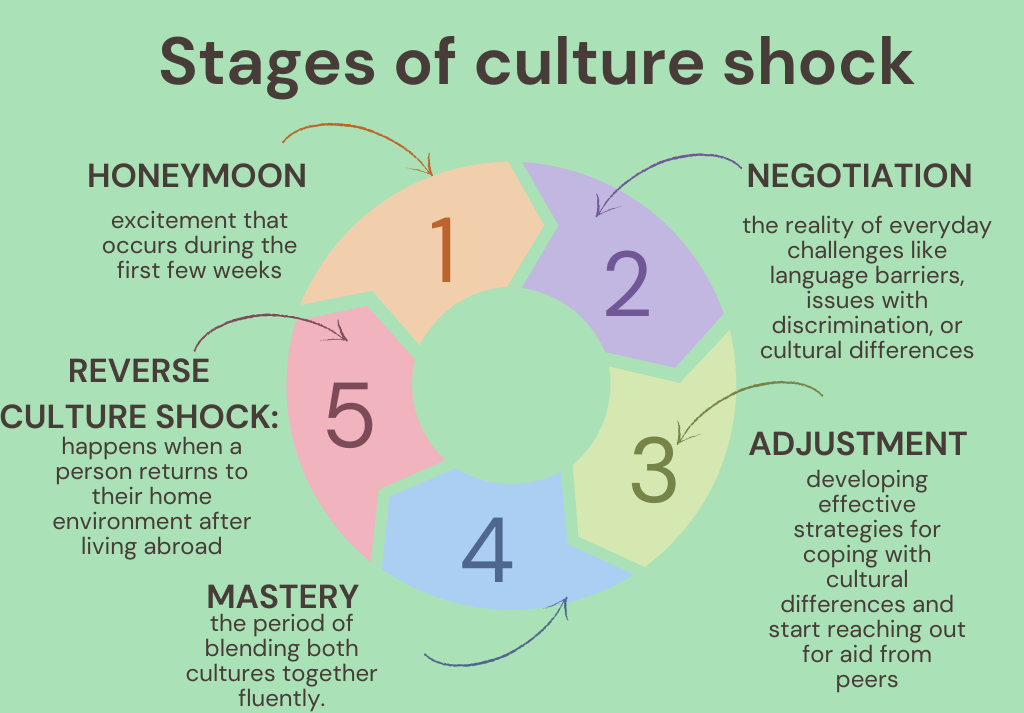Are you planning to move to Australia for further studies, or are you already in the sun-kissed country? If the answer is yes, you might have become familiar with the word as well as the feeling of “Cultural Adjustment.”
Cultural adjustment generally means individuals from one culture or country adapt to a new and different culture. It involves navigating and acclimating to various aspects of a foreign culture, including its customs, traditions, social norms, language, and daily life practices. Cultural adjustment is not a linear process but rather a series of stages that individuals go through as they gradually become more comfortable and integrated into their new cultural environment.

Arrival and Initial Experiences
- Dealing with jet lag and travel fatigue: Upon arrival in Australia, it’s common for international students to experience jet lag and travel fatigue due to long flights and time zone differences. To mitigate these effects, staying hydrated during the flight, adjusting sleep patterns gradually, and engaging in light physical activity upon arrival is advisable. Exposure to natural daylight can help reset the body’s internal clock and alleviate jet lag more quickly.
- Navigating the airport and transportation to your accommodation: Navigating the airport and arranging transportation to your accommodation is an essential part of the initial experience. Prior research on airport layouts and transportation options can be immensely helpful. Many international airports have clear signage in multiple languages, making it easier for newcomers. Pre-booking transportation, such as a shuttle service or taxi, can reduce stress and ensure a smoother transition to your destination.
- Initial encounters with local customs and behaviors: When first arriving in Australia, international students may encounter local customs and behaviors that differ from their home country. It’s essential to approach these experiences with an open mind and a willingness to learn. Observing and respecting local customs, such as greetings and social norms, demonstrates cultural sensitivity and facilitates smoother interactions with locals.
- Coping with homesickness and loneliness: Homesickness and loneliness are common initial feelings for international students. To cope, maintaining regular communication with loved ones back home can provide comfort. Engaging in social activities and seeking out international student support services on campus can help combat loneliness. Building a new social network and creating a sense of belonging in Australia are effective ways to overcome these initial emotions and foster a positive adjustment experience.
Academic Adjustment
Adapting to the Australian education system is a critical aspect of academic adjustment for international students. It involves understanding Australian universities’ curriculum structure, grading system, and assessment methods. Students should familiarize themselves with course requirements, academic expectations, and the importance of active class participation. A clear understanding of Australia’s academic culture will help students excel in their studies.
Effective management of coursework, assignments, and exams is essential for academic success. International students should create a study schedule to stay

organized and meet deadlines. They should also seek clarification from professors or tutors if they encounter challenges with course content. Understanding assessment criteria and practicing time management can significantly reduce stress during exam periods.
Building strong study habits and time management skills is crucial. This includes setting realistic goals, breaking tasks into manageable chunks, and creating a conducive study environment. International students should prioritize self-discipline and avoid procrastination. Utilizing resources like academic advisors, study groups, and campus libraries can enhance study habits and promote academic excellence.
Australian universities offer a wealth of academic integration, support, and resources to assist international students. These include writing centers, tutoring services, and workshops on academic skills. Students should proactively seek out these resources to enhance their understanding of course material, improve writing and research skills, and receive guidance on academic challenges. Building a strong academic support network is key to academic adjustment and success.
Social Integration

.Actively listening, asking clarifying questions, and seeking to understand different communication styles can help bridge cultural gaps. Additionally, universities often offer workshops or resources on cross-cultural communication to aid students in navigating these challenges effectively.
Navigating Daily Life
- Understanding Australian Etiquette and Social Norms:
Understanding Australian etiquette and social norms is crucial for international students to adapt to daily life smoothly. This includes practices related to greetings, punctuality, respect for personal space, and appropriate behavior in various social settings. Being aware of these norms fosters positive interactions and cultural immersion.
- Exploring Healthcare and Insurance Options:
Navigating the healthcare system in Australia is essential for students’ well-being. International students should research healthcare services available in their area, including access to general practitioners and hospitals. Understanding health insurance requirements and obtaining appropriate coverage is mandatory. Overseas Student Health Cover (OSHC) is often a prerequisite for obtaining a student visa and should be arranged before arrival.
- Handling Finances and Managing Expenses:
Managing finances and expenses is a key aspect of daily life. International students should create a budget that includes tuition fees, accommodation costs, groceries, transportation, and discretionary spending. Opening a local bank account simplifies financial transactions, and students should explore options for part-time work to support their expenses while adhering to visa regulations.
- Finding Accommodation and Understanding Rental Agreements:
Finding suitable accommodation and understanding rental agreements is vital. Students can explore on-campus or off-campus housing options, such as university dormitories or shared apartments. Before signing, thoroughly reviewing rental agreements, including terms, rent, and responsibilities, is essential. Knowing tenant rights and obligations helps ensure a smooth settling in Australia.
Overcoming Challenges
- Coping with Language Barriers:
Coping with language barriers is a common challenge for international students. To overcome this obstacle, students can enroll in language courses or conversation groups offered by their university. Engaging with English-speaking peers, reading, and watching local media can also improve language proficiency over time. Patience and a willingness to learn are key to mastering a new language.
- Addressing Discrimination or Bias:
Addressing discrimination or bias, should it occur, is essential for a positive experience in Australia. International students should be aware of their rights and university policies regarding discrimination. Reporting incidents of discrimination to the appropriate authorities is crucial. Seeking support from student services or advocacy groups can help navigate such situations and promote a diverse and inclusive campus environment.
- Seeking Mental Health and Well-being Support:
Maintaining mental health and well-being is paramount. International students should be aware of the mental health services available on campus and in the local community. It’s important to recognize the signs of stress or mental health challenges and seek help when needed. Universities often offer counseling services to guide and support students facing emotional or psychological difficulties.
Wrapping It Up!
Once you get comfortable with the new country and its surroundings, you start to learn about what skills the job market demands. And here’s when DP Training comes into the picture. We are here to provide national and international students with courses that ultimately enhance the skills as well as the career of an individual.
Are you looking for courses in Australia for international students? If yes. Then, what are you waiting for? Visit our website today and enrol yourself in one of the courses that will upskill you brilliantly.
Happy Learning!!!



Frequently Asked Questions
1. What is cultural adjustment, and why is it important for international students in Australia?
Cultural adjustment refers to the process of adapting to a new culture, and it’s essential for international students to thrive in Australia as it helps them navigate the challenges of a foreign environment and make the most of their academic journey.
2. How can I prepare for cultural adjustment before arriving in Australia?
Preparing for cultural adjustment involves researching Australian culture, understanding visa and immigration requirements, packing essentials, and setting realistic expectations for your stay.
3. What should I do if I experience homesickness and loneliness upon arrival?
Homesickness and loneliness are common feelings for international students. To cope, stay connected with loved ones back home, participate in social activities on campus, and seek support from fellow students and student services.
4. What resources are available on campus to help with academic adjustment?
Australian universities offer various resources, including academic advisors, writing centers, and tutoring services, to assist international students in their academic journey.
5. How can I effectively build a social network and make friends in Australia?
Building a social network involves participating in campus clubs, events, and cultural activities. Being open, approachable, and respectful of diverse backgrounds can facilitate the process of making friends.

